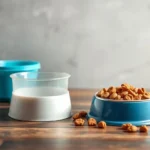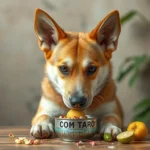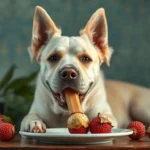
Introduction
Proper nutrition plays a crucial role in ensuring the health and longevity of our furry companions. For Miniature Schnauzers, a breed known for its spirited personality and distinctive appearance, understanding their unique dietary needs is essential. With their small stature and specific health considerations, choosing the best dog foods for Miniature Schnauzers can significantly impact their overall well-being. This guide will delve into the characteristics of this breed, their nutritional requirements, and the best food options available to help you make informed decisions for your Schnauzer.
Understanding Miniature Schnauzers
Breed Characteristics
Miniature Schnauzers are small dogs, typically weighing between 11 to 20 pounds and standing about 12 to 14 inches tall. They feature a distinctive double coat that requires regular grooming to maintain their signature look. Known for their lively and intelligent nature, these dogs are often eager to please, making them excellent companions.
In terms of temperament, Miniature Schnauzers are alert, spirited, and confident. They possess high energy levels, which means they require regular exercise and mental stimulation to remain healthy and happy. Their playful demeanor and affectionate nature make them a favorite among families.
Health Considerations
While Miniature Schnauzers are generally healthy, they are predisposed to certain health issues such as pancreatitis, hip dysplasia, and bladder stones. Understanding these potential problems emphasizes the importance of proper nutrition in managing their health. A well-balanced diet can help mitigate some risks and support their overall health, making it essential to choose the right food.
Nutritional Needs of Miniature Schnauzers
Macronutrients
To maintain optimal health, Miniature Schnauzers require a balanced intake of macronutrients: proteins, fats, and carbohydrates.
-
Proteins: These are essential for muscle development and overall health. Miniature Schnauzers typically need protein levels between 18% to 25% in their diet. High-quality animal-based proteins such as chicken, beef, or fish should be prioritized.
-
Fats: Healthy fats provide energy and support skin and coat health. Look for dog foods with omega-3 and omega-6 fatty acids, which are crucial for maintaining a shiny coat and healthy skin.
-
Carbohydrates: While not as essential as protein and fats, complex carbohydrates can provide necessary energy. Whole grains, veggies, and fruits can be beneficial but should be included in moderation.
Micronutrients
Micronutrients, such as vitamins and minerals, are vital for Miniature Schnauzers. Essential nutrients include:
-
Vitamins: Ensure the food contains vitamins A, D, E, and B-complex vitamins, which support vision, bone growth, energy levels, and overall health.
-
Minerals: Calcium, phosphorus, and potassium are crucial for bone health and muscle function.
-
Antioxidants: Ingredients rich in antioxidants help combat oxidative stress, promoting longevity and wellness.
-
Omega Fatty Acids: These are essential for brain health and a healthy coat. Look for sources like fish oil or flaxseed.
Age-Specific Nutritional Needs
Miniature Schnauzers have different dietary requirements as they age, including:
-
Puppies: Require higher protein and fat content to support growth and development. Look for puppy-specific formulas.
-
Adults: Should maintain a balanced diet focusing on weight management and overall health.
-
Seniors: May need lower-calorie diets to prevent obesity and support joint health. Senior formulas often include joint supplements such as glucosamine.
Types of Dog Food
Dry Kibble
Dry kibble is a popular choice among dog owners due to its convenience and shelf stability.
-
Benefits: Kibble can help maintain dental health by reducing plaque and tartar buildup. It is also easy to measure and store.
-
Drawbacks: Some lower-quality kibble may contain fillers or artificial additives. It’s essential to choose high-quality brands.
Recommended Brands:
- Royal Canin Miniature Schnauzer Adult: Specially formulated for Schnauzers with optimal protein and fat levels.
- Hill’s Science Diet Adult Small Paws: Offers balanced nutrition with high-quality ingredients.
- Wellness CORE Small Breed: Grain-free and rich in protein to support active lifestyles.
Wet Food
Wet food can be an excellent option for picky eaters or dogs who need extra hydration.
-
Advantages: It often contains higher moisture content, which can be beneficial for urinary tract health. Additionally, many dogs find wet food more palatable.
-
When to consider it: If your Schnauzer has dental issues or prefers softer food.
Top Wet Food Brands:
- Blue Buffalo Homestyle Recipe: Made with real meat and wholesome ingredients.
- Merrick Grain-Free Texas Beef: High protein and grain-free, promoting healthy digestion.
- Purina Pro Plan Savor Adult: Balanced nutrition with a variety of flavors.
Raw Diet
A raw diet, or “BARF” (biologically appropriate raw food), emphasizes feeding dogs raw meat, bones, fruits, and vegetables.
-
Potential benefits: Advocates claim it can lead to shinier coats, healthier skin, and improved digestion.
-
Considerations: It’s crucial to ensure a balanced diet and consult with a veterinarian to avoid nutritional deficiencies and foodborne illnesses.
Homemade Diets
Preparing homemade meals for your Miniature Schnauzer can be a rewarding experience.
-
Guidelines: Ensure the diet is well-balanced, including proteins, healthy fats, and carbohydrates. Consult with a veterinarian to create appropriate recipes.
-
Key ingredients: Lean meats, vegetables, and whole grains. Avoid toxic foods like onions, garlic, and chocolate.
Factors to Consider When Choosing Dog Food
Ingredient Quality
The quality of ingredients plays a significant role in your dog’s health.
-
Whole food ingredients: Foods made with real meat, vegetables, and grains are preferable. Avoid products with fillers like corn and soy.
-
Understanding labels: Familiarize yourself with dog food labels to identify high-quality ingredients.
Allergies and Sensitivities
Miniature Schnauzers can be prone to food allergies, so it’s essential to monitor for any adverse reactions.
-
Common allergens: Beef, chicken, wheat, and dairy are frequent culprits.
-
Hypoallergenic options: If your Schnauzer shows signs of allergies, consider grain-free or limited-ingredient diets.
Size and Shape of Kibble
Kibble size and shape can impact dental health and ease of eating.
- Importance: Smaller kibble is easier for Miniature Schnauzers to chew and digest. Shapes that promote chewing can help maintain dental health.
Recommended Dog Foods for Miniature Schnauzers
Top Commercial Brands
When considering the best dog foods for Miniature Schnauzers, here are some top brands to consider:
- Royal Canin Miniature Schnauzer Adult
- Overview: Specifically designed for Schnauzers.
- Ingredients: Chicken meal, corn, gluten meal, and rice.
-
Benefits: Supports skin health and optimal weight.
-
Hill’s Science Diet Adult Small Paws
- Overview: Tailored for small breeds.
- Ingredients: Chicken, barley, and brown rice.
-
Benefits: Supports heart health and digestion.
-
Wellness CORE Small Breed
- Overview: Grain-free option packed with protein.
- Ingredients: Turkey, chicken meal, and peas.
- Benefits: Promotes lean body mass and muscular strength.
Comparison Table
| Brand | Protein Content | Fat Content | Price (Approx) |
|---|---|---|---|
| Royal Canin Miniature Schnauzer | 24% | 15% | $70 for 30 lbs |
| Hill’s Science Diet | 22% | 14% | $60 for 30 lbs |
| Wellness CORE | 34% | 16% | $75 for 26 lbs |
Feeding Guidelines
Portion Sizes
Portion control is vital for maintaining a healthy weight.
-
Recommended daily caloric intake: Miniature Schnauzers typically need around 400-600 calories per day, depending on age and activity level.
-
Measuring portion sizes: Use measuring cups to ensure accurate servings based on the feeding guidelines provided by the dog food manufacturer.
Feeding Schedule
Establishing a regular feeding schedule helps maintain your Schnauzer’s routine.
- Frequency: Puppies may require three meals a day, while adults generally do well with two meals. Senior dogs may benefit from smaller, more frequent meals.
Treats and Supplements
Healthy treats can enhance your Miniature Schnauzer’s diet.
-
Healthy treat options: Look for low-calorie treats or those made with whole ingredients. Fresh fruits and vegetables can also be great choices.
-
Supplements: Consider omega-3 fatty acids for skin health or glucosamine for joint support, especially in older dogs. Always consult your vet before introducing supplements.
Monitoring Your Schnauzer’s Health
Signs of Good Nutrition
Indicators that your Miniature Schnauzer is receiving proper nutrition include:
- Coat condition: A shiny, healthy coat is a sign of good nutrition.
- Energy levels: Regular playfulness and energy indicate a balanced diet.
- Weight maintenance: A healthy weight should be maintained without excessive weight loss or gain.
When to Consult a Veterinarian
Regular veterinary check-ups are essential for monitoring your Schnauzer’s health.
-
Signs for dietary changes: If you notice excessive weight gain, lethargy, or digestive issues, it may be time to reevaluate your dog’s diet.
-
Importance of vet guidance: A veterinarian can provide personalized dietary recommendations based on your Schnauzer’s health status and lifestyle.
Conclusion
Tailored nutrition is vital for the well-being of Miniature Schnauzers. By understanding their unique dietary needs and selecting high-quality foods, you can help your furry friend live a happy, healthy life. As you research and choose the best dog foods for Miniature Schnauzers, remember the importance of consulting with a veterinarian for personalized dietary advice. This ensures that your beloved Schnauzer receives the nutrition they need to thrive.









